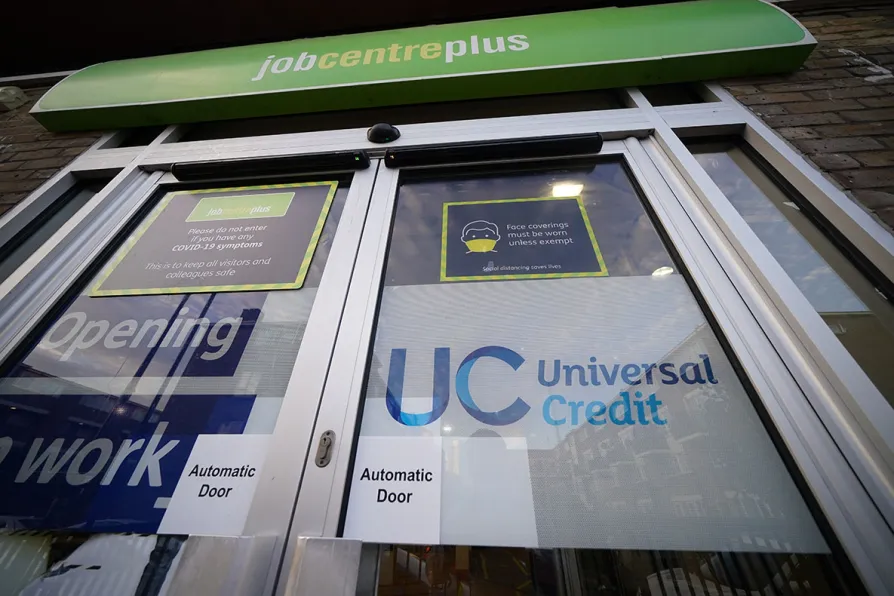Welfare system 'failing to meet minimum thresholds for a dignified standard of living'

 A Universal Credit sign on a door of a job centre plus in east London
A Universal Credit sign on a door of a job centre plus in east London
BRITAIN’S “consciously cruel” welfare system is failing to provide social security, stripping people of their dignity, ruining lives, and breaching international obligations, according to a damning new report.
Speaking to more than 700 people who claim welfare supports, Amnesty UK’s Social Insecurity report found: “Universal credit, disability social security schemes, carer’s allowance, and support for asylum-seekers remain particularly inadequate, failing to meet minimum thresholds for a dignified standard of living.”
It continued: “It is clear that policies like social security freezes, caps, and deductions, removal of the spare room subsidy (bedroom tax) and two-child limit have deepened poverty and disproportionately harmed children, disabled individuals and low-income families.”
The charity concluded that the state of social security was now so poor that it failed to “stand up to the international human rights frameworks,” and that Britain was now in breach of the International Covenant on Economic, Social and Cultural Rights (ICESCR), ratified by parliament in 1976.
It added: “The result is a system that, by design, perpetuates the deprivation of living standards for those reliant on it, subjecting them to orchestrated stigma and a systematic erosion of their dignity.”
One of those interviewed for the study, was Isla, a carer in her 60s from the Scottish Borders, who told the charity: “The poorest in society have become easy targets. It feels like people are being pitted against each other, rather than addressing the real issues.”
Scotland director for Amnesty, Neil Cowan said: “Lives are being ruined by a system that is consciously cruel – it erodes dignity by design and violates people’s human rights daily.
“The UK social security system is impenetrable, inadequate, and for some completely inaccessible. It is forcing people across Scotland and the rest of the UK to make impossible choices that not one of us should have to make.
“Rather than cutting support for disabled people while maintaining some of the system’s most atrocious policies like the two-child limit, UK ministers should be overhauling the system so that it prevents and reduces poverty, while protecting people’s rights.”
Echoing the report’s call for an “overhaul”, he added: “We need a landmark, independent Social Security Commission with statutory powers to build a UK social security system that loosens, rather than tightens, the grip of poverty on people’s lives.
“It must be rooted in dignity and human rights and designed by and for the people. This must protect us all — be that today or in the future where we all may need it.”
Turning his attention to Scotland, he urged ministers to “learn the lessons” from the report as the SNP government set about delivering on its pledge to scrap the two-child cap by next year’s Holyrood election.
Responding, SNP social justice secretary Shirley-Anne Somerville said: “The irresponsible and damaging welfare cuts, upon which the UK government is utterly intent, aim to balance the books by targeting the most vulnerable.
“Although UK ministers say they want to reduce child poverty, their own analysis estimates that the cuts announced in the Spring Statement will push a further 50,000 children, into poverty.
“I am calling on the UK government to abandon its rushed and harmful reforms.
“It is not too late for them to change course, and follow the Scottish government’s lead in protecting and enhancing the social security safety net rather than wantonly dismantling it and stigmatising those who need its support.”
A Westminster government spokesperson said: “We inherited a fundamentally broken welfare system which does not work for the people it is supposed to support.
“That’s why, as we secure Britain’s future through our Plan for Change, our reforms to health and disability benefits will ensure the welfare system is there to protect those who need it most.”
Responding to the report, Linda Burnip from campaign group Disabled People Against Cuts told the Star: “We do plan when it becomes possible to use the Human Rights Act to seek a legal challenge, but at the moment primary legislation which has to go through parliament doesn’t — amazingly — have to meet the Equality Act or public-sector equality duties.
“We’d agree with everything Amnesty has said, although it’s a shame it has taken it so long to realise what others have known for the last 15 years.”













